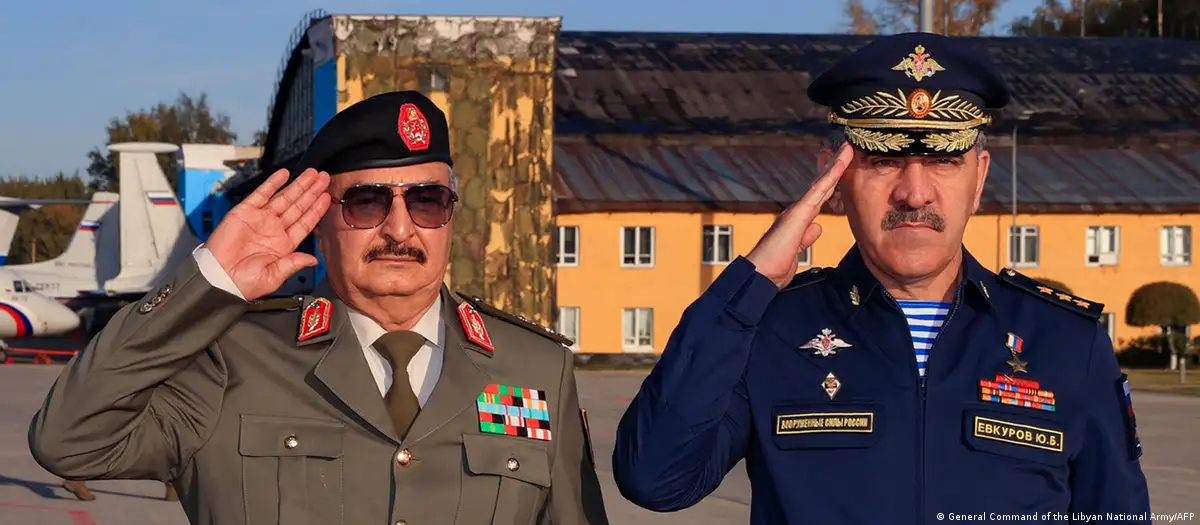Under the leadership of the new general of the Russian mercenary group, Andrei Averyanov, Moscow is trying to expand its influence in the African country. What does this mean for the democratic transition?
(DW) Years of war and chaos, an ongoing political stalemate, devastating floods in September last year and the absence of a democratic path have made Libya prone to the influence of foreign militias such as the Wagner Group.
The Russian mercenary group has been present in the African country since 2018.
However, according to a recent report by the London-based military think tank Royal United Services Institute, or Rusi, Russia is about to further intensify such efforts in the form of a “Roscolonial Entente” – a group of nations actively seeking to help Russia – in the Middle East and Africa.
Politically fragmented but rich in oil and gold, Libya on the Mediterranean Sea is an excellent candidate for this kind of new “Russian colonialism”.
The country has been divided under two rival administrations since 2014. In the west, power is in the hands of the National Unity Government, an internationally recognized and UN-mediated interim leadership based in Tripoli with Abdul Hamid Dbeibah as prime minister. This government is backed by Turkish militias.
On the other hand, the eastern side is administered by the National Stability Government of Prime Minister Ossama Hamad, based in Tobruk, which is supported by the Libyan National Army under the command of General Khalifa Hiftar.
“Wagner’s objectives in Libya have primarily been to gain access to oil revenues, more or less indirectly through support for Hiftar’s armed forces, but also to secure wider access to the African continent,” Tim Eaton, senior research fellow at London think tank Chatham House, told DW.
“In that sense, Libya has acted as a bridge,” he added.

Security resources
Founded in 2014, the Wagner Group was run for years by Russian millionaire Yevgeny Prigozhin, who used to have close ties to President Vladimir Putin – or at least until he led a rebellion against the Kremlin in June 2023.
Two months later, Prigozhin died in a plane crash. Since then, the Wagner Group has been under the auspices of Russian military intelligence.
Its new leader, General Andrei Averyanov, is suspected of overseeing foreign assassinations and playing a role in destabilizing European countries.
Now under his command, the mercenaries in Libya have been renamed the “Expeditionary Corps”.
“By replacing Prigozhin with someone closer to the regime and with experience in Russian intelligence, the Wagner Group’s operations have become more openly linked to Moscow,” Hager Ali, a researcher at the German think tank GIGA German Institute for Global and Area Studies, told DW.
Whereas before the Kremlin could deny any connection with the militia’s activities, she points out, Averyanov “eliminates that plausible deniability, because now it’s really another direct extension of Russia’s interests in Africa and the Middle East.”
But not all Wagner fighters are happy with the new leadership, points out Ruslan Suleymanov, an independent Middle East expert based in Baku.
“To this day, there are difficult negotiations with former Wagner fighters to sign a contract with the Russian Defense Ministry,” he told DW.
Still, one of the first people Averyanov met in his new post last September was General Hiftar.
Both sides reaffirmed their commitment to what can be summed up as a “security for resources” agreement, the RUSI report said.
Wagner’s fighters continue to support Hiftar and are, in turn, allowed to continue using the strategically located country for arms transit, drug smuggling and to run three Libyan air bases.
Such bases allow Russia to bring the gold that was mined under Wagner’s leadership in Libya to the country, which is now the target of strict sanctions due to its attack on Ukraine.
“The Wagner has also been transporting portable surface-to-air missiles, ammunition, fuel and other cargo from Libya to the Sudanese Rapid Support Forces, which are at war with the Sudanese Armed Forces,” said another recent GIGA analysis, said Hager Ali.
For Libyans, however, having Wagner mercenaries in the country also implies “serious human rights abuses, including torture, mass rape and extrajudicial killings,” the EU concluded as early as December 2021.

Wagner has the potential to undermine the democratic transition
The last attempt to hold elections in Libya failed in December 2021. Since then, none of the parties have been able or willing to agree on measures that could overcome the political impasse.
In February, Abdoulaye Bathily, the UN special envoy for Libya, once again urged Libyan leaders to “put their self-interest aside and come to the negotiating table in good faith, willing to discuss all contested issues”.
Otherwise, he warned, “the fragility of the institutions and the deep divisions within the nation pose serious risks to stability”.
Hager Ali, however, does not hold out hope that Libya can return to an electoral or demographic trajectory as long as the Wagner Group is present.
“The Wagner Group carries out online disinformation campaigns,” she said, adding that the paramilitary group can interfere in electoral preparations, intimidate voters through violence and even help rig elections.
And in the case of Libya, “where there are still political parties that need to establish an electoral base and make decisions about the electoral process itself, disinformation is extremely damaging to the integrity of any electoral process.”
*** Translated by DEFCONPress FYI Team ***
